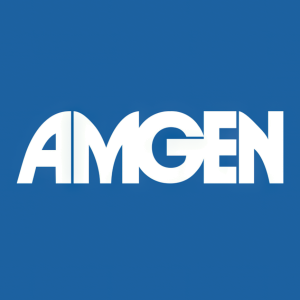Amgen To Showcase New Data From Inflammation Portfolio At EADV Virtual Congress 2021
Rhea-AI Summary
Amgen (NASDAQ: AMGN) announced new data from its inflammation pipeline will be presented at the EADV 30th Congress from Sept. 29 to Oct. 2, 2021. Key highlights include late-breaking results from a Phase 2 study of AMG 451/KHK4083, a potential treatment for moderate-to-severe atopic dermatitis, and new data from the Phase 3 ADVANCE trial on Otezla's efficacy for plaque psoriasis. Amgen aims to share insights into innovative treatments for patients with severe skin conditions, reflecting its commitment to dermatologic diseases advancement.
Positive
- Presentation of late-breaking Phase 2 study results on AMG 451/KHK4083 for atopic dermatitis.
- New data from the Phase 3 ADVANCE trial on Otezla's efficacy in psoriasis.
- Collaboration with Kyowa Kirin to develop and commercialize AMG 451/KHK4083.
Negative
- None.
News Market Reaction 1 Alert
On the day this news was published, AMGN gained 1.39%, reflecting a mild positive market reaction.
Data tracked by StockTitan Argus on the day of publication.
THOUSAND OAKS, Calif., Sept. 13, 2021 /PRNewswire/ -- Amgen (NASDAQ: AMGN) today announced that new data from its expanding inflammation pipeline and marketed portfolio will be presented at the European Academy of Dermatology and Venereology (EADV) 30th Congress, which will take place virtually Sept. 29 – Oct. 2.
In a late-breaking data presentation, detailed results from a Phase 2 moderate-to-severe atopic dermatitis study of AMG 451/KHK4083, a potential first-in-class anti-OX40 monoclonal antibody jointly under development by Amgen and Kyowa Kirin Co., Ltd. (TSE: 4151) for the treatment of moderate-to-severe atopic dermatitis, will be presented. Additionally, new 32-week outcomes data from the Phase 3 ADVANCE trial investigating the efficacy and safety of Otezla® (apremilast) to improve psoriasis symptoms and involvement in special areas (scalp or nails) in adults with mild-to-moderate plaque psoriasis will also be presented.
"Amgen looks forward to sharing new late-breaking research at EADV alongside our partners at Kyowa Kirin, highlighting a potential new treatment option for the millions of people worldwide with moderate-to-severe atopic dermatitis," said David M. Reese, M.D., executive vice president of Research and Development at Amgen. "We are deeply committed to driving innovation in dermatologic inflammatory diseases, and this research – as well as other data for presentation from across our portfolio – demonstrates the important strides we are making to help improve outcomes for patients with these serious skin conditions."
Inflammation Pipeline Abstracts
- Efficacy and safety results of KHK4083/AMG 451 (anti-OX40 mAb) in subjects with moderate to severe atopic dermatitis: a phase 2, multicentre, randomized, double-blind, parallel-group, placebo-controlled study
- Abstract #D3T01.1B, Late-breaking Oral Presentation, Session: Late-breaking News, Saturday, Oct. 2 from 10:15-10:30 am CEST
Otezla Clinical Data Abstracts
- Improvement in Psoriasis Symptoms and Involvement in Special Areas: 32-Week Results From ADVANCE
- Abstract #P1425, E-Poster, Session: Psoriasis, Wednesday, Sept. 29 from 6 am-11:59 pm CEST
- Improvement in Patient- and Physician-Reported Outcomes With Apremilast Treatment in Patients With Mild to Moderate Plaque Psoriasis in the Phase 3 ADVANCE Trial: Results of Subgroup Analyses by Baseline Psoriasis-Involved BSA and PASI
- Abstract #P1334, E-Poster, Session: Psoriasis, Sept. 29 from 6 am-11:59 pm CEST
- Efficacy of Apremilast in Mild to Moderate Psoriasis Including Special Areas and Itch: 32-Week Results From the PROMINENT Study in Japan
- Abstract #P1352, E-Poster, Session: Psoriasis, Sept. 29 from 6 am-11:59 pm CEST
- Efficacy and Safety of Apremilast in Japanese Patients With Mild to Moderate Psoriasis: 32-Week Results From PROMINENT
- Abstract #P1422, E-Poster, Session: Psoriasis, Sept. 29 from 6 am-11:59 pm CEST
Real-World Study Abstracts
- Differences in Patient and Dermatologist Perspectives on Psoriasis Treatment: Results From the UPLIFT Survey
- Abstract #FC03.01, Oral Presentation, Session: Free Communications, Sept. 30 from 2:30-2:40 pm CEST
- Greater Disease Burden in Patients With Psoriasis Who Report Joint Pain Without a Diagnosis of Psoriatic Arthritis: Results From the 2020 UPLIFT Survey
- Abstract #P1465, E-Poster, Session: Psoriasis, Sept. 29 from 6 am-11:59 pm CEST
- Analysis of Real-world Systemic-Naive Patients With Mild or Moderate vs Severe Plaque Psoriasis: Patient Characteristics and Disease Burden Findings From CorEvitas' Psoriasis Registry
- Abstract #P1409, E-Poster, Session: Psoriasis, Sept. 29 from 6 am-11:59 pm CEST
Abstracts can be found on the EADV website.
Amgen Webcast Investor Call
Amgen will host a webcast call for the investment community at 8:30 a.m. ET on Monday, Oct. 4, 2021. David M. Reese, M.D., executive vice president of Research and Development at Amgen, along with other members of Amgen's management team, will discuss clinical data being presented at EADV, including data from the AMG 451/KHK4083 Phase 2 trial in patients with moderate-to-severe atopic dermatitis, as well as the broader inflammation portfolio.
Live audio of the conference call will be broadcast over the internet simultaneously and will be available to members of the news media, investors and the general public.
The webcast, as with other selected presentations regarding developments in Amgen's business given at certain investor and medical conferences, can be accessed on Amgen's website, www.amgen.com, under Investors. Information regarding presentation times, webcast availability and webcast links are noted on Amgen's Investor Relations Events Calendar. The webcast will be archived and available for replay for at least 90 days after the event.
About the AMG 451/KHK4083 Phase 2 Study
The Phase 2, multicenter, randomized, double-blind, placebo-controlled trial (NCT03703102) investigated the efficacy and safety of AMG 451/KHK4083 in adults with moderate-to-severe atopic dermatitis who were not adequately controlled with topical agents. The study randomized 274 patients in the U.S., Japan, Canada and Germany across four dose-ranging active treatment arms, which received subcutaneous AMG 451/KHK4083, and a comparator placebo arm.
The primary endpoint was percentage change from baseline in Eczema Area and Severity Index (EASI) score at week 16.
About Atopic Dermatitis
Atopic dermatitis is a chronic inflammatory disease that causes excessively dry, itchy skin that can be painful. Repeated scratching can cause the skin to thicken, harden or become vulnerable to infection. Atopic dermatitis is the most common form of eczema – affecting 15
About AMG 451/KHK4083
AMG 451/KHK4083 is an anti-OX40 fully human monoclonal antibody engineered with Kyowa Kirin's patented POTELLIGENT® defucosylation technology to enhance its antibody-dependent cellular cytotoxicity (ADCC) activity. The initial AMG 451/KHK4083 antibody was discovered in collaboration between Kyowa Kirin US Research and La Jolla Institute for Immunology. AMG 451/KHK4083 targets and inhibits the activity of the OX40 receptor expressed on the surface of effector T-cells, and has been shown to deplete activated OX40+ T-cells by ADCC. It has been reported that effector T cells expressing OX40 are present in the lesions of patients with atopic dermatitis and are critical in their development.
Amgen and Kyowa Kirin Collaboration
On June 1, 2021, Amgen (NASDAQ:AMGN) entered into an agreement with Kyowa Kirin (TSE: 4151) to jointly develop and commercialize AMG 451/KHK4083. Under the terms of the agreement, Amgen will lead the development, manufacturing, and commercialization of AMG 451/KHK4083 for all markets globally, except Japan, where Kyowa Kirin will retain all rights. If approved, the companies will co-promote the asset in the United States and Kyowa Kirin has opt-in rights to co-promote it in certain other markets including Europe and Asia.
About ADVANCE (PSOR-022)
ADVANCE (NCT03721172) is a Phase 3, multicenter, randomized, placebo-controlled, double-blind study evaluating the efficacy and safety of Otezla in patients with mild-to-moderate plaque psoriasis (defined as BSA involvement of
The primary endpoint was the percentage of patients with sPGA response [defined as a sPGA score of clear (0) or almost clear (1) with at least a 2-point reduction from baseline] at week 16.
About PROMINENT
PROMINENT (NCT03930186) is Phase 3b, multicenter, open-label, single-arm study evaluating the efficacy and safety of Otezla in Japanese patients with mild-to-moderate psoriasis (sPGA score of 2 to 3) not adequately controlled by topical therapy. The study recruited 152 patients to receive Otezla 30 mg twice daily for 32 weeks on top of their existing topical therapy.
The primary endpoint was percentage of patients who achieved an sPGA score of 0 or 1 at week 16.
About the UPLIFT Survey
In 2020, Amgen conducted the global Understanding Psoriatic Disease Leveraging Insights for Treatment (UPLIFT) survey exploring the evolution of attitudes and behaviors of 3,806 people living with psoriasis and psoriatic arthritis, 473 dermatologists and 450 rheumatologists in eight countries in North America, Europe and Asia. The survey was conducted in 2020 and was overseen by an academic steering committee of thought-leaders in dermatology and rheumatology. The survey builds upon findings from the 2012 Multinational Assessment of Psoriasis and Psoriatic Arthritis (MAPP) survey, a first-of-its-kind study conducted by Celgene that looked in-depth at the effect of psoriasis and psoriatic arthritis on people living with these conditions.
About Psoriasis
Psoriasis is a serious, chronic inflammatory disease that causes raised, red, scaly patches to appear on the skin, typically affecting the outside of the elbows, knees or scalp, though it can appear on any location.1 Approximately 125 million people worldwide have psoriasis, including around 14 million people in Europe and more than 7.5 million people in the United States.2,3 About
About Otezla® (apremilast)
OTEZLA® (apremilast) is an oral small-molecule inhibitor of phosphodiesterase 4 (PDE4) specific for cyclic adenosine monophosphate (cAMP). PDE4 inhibition results in increased intracellular cAMP levels, which is thought to indirectly modulate the production of inflammatory mediators. The specific mechanism(s) by which Otezla exerts its therapeutic action in patients is not well defined.
Otezla® (apremilast) U.S. INDICATIONS
Otezla® (apremilast) is indicated for the treatment of adult patients with moderate to severe plaque psoriasis who are candidates for phototherapy or systemic therapy.
Otezla is indicated for the treatment of adult patients with active psoriatic arthritis.
Otezla is indicated for the treatment of adult patients with oral ulcers associated with Behçet's Disease.
Otezla® (apremilast) U.S. IMPORTANT SAFETY INFORMATION
Contraindications
- Otezla® (apremilast) is contraindicated in patients with a known hypersensitivity to apremilast or to any of the excipients in the formulation
Warnings and Precautions
- Diarrhea, Nausea, and Vomiting: Cases of severe diarrhea, nausea, and vomiting were associated with the use of Otezla. Most events occurred within the first few weeks of treatment. In some cases, patients were hospitalized. Patients 65 years of age or older and patients taking medications that can lead to volume depletion or hypotension may be at a higher risk of complications from severe diarrhea, nausea, or vomiting. Monitor patients who are more susceptible to complications of diarrhea or vomiting; advise patients to contact their healthcare provider. Consider Otezla dose reduction or suspension if patients develop severe diarrhea, nausea, or vomiting
- Depression: Carefully weigh the risks and benefits of treatment with Otezla for patients with a history of depression and/or suicidal thoughts/behavior, or in patients who develop such symptoms while on Otezla. Patients, caregivers, and families should be advised of the need to be alert for the emergence or worsening of depression, suicidal thoughts, or other mood changes, and they should contact their healthcare provider if such changes occur
- Psoriasis: Treatment with Otezla is associated with an increase in depression. During clinical trials,
1.3% (12/920) of patients reported depression compared to0.4% (2/506) on placebo. Depression was reported as serious in0.1% (1/1308) of patients exposed to Otezla, compared to none in placebo-treated patients (0/506). Suicidal behavior was observed in0.1% (1/1308) of patients on Otezla, compared to0.2% (1/506) on placebo. One patient treated with Otezla attempted suicide; one patient on placebo committed suicide - Psoriatic Arthritis: Treatment with Otezla is associated with an increase in depression. During clinical trials,
1.0% (10/998) reported depression or depressed mood compared to0.8% (4/495) treated with placebo. Suicidal ideation and behavior was observed in0.2% (3/1441) of patients on Otezla, compared to none in placebo-treated patients. Depression was reported as serious in0.2% (3/1441) of patients exposed to Otezla, compared to none in placebo-treated patients (0/495). Two patients who received placebo committed suicide compared to none on Otezla - Behcet's Disease: Treatment with Otezla is associated with an increase in depression. During the phase 3 clinical trial,
1% (1/104) reported depression or depressed mood compared to1% (1/103) treated with placebo. No instances of suicidal ideation or behavior were reported in patients treated with Otezla or treated with placebo - Weight Decrease: Monitor body weight regularly; evaluate unexplained or clinically significant weight loss, and consider discontinuation of Otezla
- Psoriasis: During clinical trials, body weight loss of 5
-10% occurred in12% (96/784) of patients treated with Otezla and in5% (19/382) of patients treated with placebo. Body weight loss of ≥10% occurred in2% (16/784) of patients treated with Otezla compared to1% (3/382) of patients treated with placebo - Psoriatic Arthritis: During clinical trials, body weight loss of 5
-10% was reported in10% (49/497) of patients taking Otezla and in3.3% (16/495) of patients taking placebo - Behçet's Disease: During the phase 3 clinical trial, body weight loss of >
5% was reported in4.9% (5/103) of patients taking Otezla and in3.9% (4/102) of patients taking placebo - Drug Interactions: Apremilast exposure was decreased when Otezla was co-administered with rifampin, a strong CYP450 enzyme inducer; loss of Otezla efficacy may occur. Concomitant use of Otezla with CYP450 enzyme inducers (e.g., rifampin, phenobarbital, carbamazepine, phenytoin) is not recommended
Adverse Reactions
- Psoriasis: Adverse reactions reported in ≥
5% of patients were (Otezla%, placebo%): diarrhea (17, 6), nausea (17, 7), upper respiratory tract infection (9, 6), tension headache (8, 4), and headache (6, 4) - Psoriatic Arthritis: Adverse reactions reported in at least
2% of patients taking Otezla, that occurred at a frequency at least1% higher than that observed in patients taking placebo, for up to 16 weeks (after the initial 5-day titration), were (Otezla%, placebo%): diarrhea (7.7, 1.6); nausea (8.9, 3.1); headache (5.9, 2.2); upper respiratory tract infection (3.9, 1.8); vomiting (3.2, 0.4); nasopharyngitis (2.6, 1.6); upper abdominal pain (2.0, 0.2) - Behçet's Disease: Adverse reactions reported in at least ≥
5% of patients taking Otezla, that occurred at a frequency at least1% higher than that observed in patients taking placebo, for up to 12 weeks, were (Otezla%, placebo%): diarrhea (41.3, 20.4); nausea (19.2, 10.7); headache (14.4, 10.7); upper respiratory tract infection (11.5, 4.9); upper abdominal pain (8.7, 1.9); vomiting (8.7, 1.9); back pain (7.7, 5.8); viral upper respiratory tract infection (6.7, 4.9); arthralgia (5.8, 2.9)
Use in Specific Populations
- Pregnancy: Otezla has not been studied in pregnant women. Advise pregnant women of the potential risk of fetal loss. Consider pregnancy planning and prevention for females of reproductive potential. There is a pregnancy exposure registry that monitors pregnancy outcomes in women exposed to Otezla during pregnancy. Information about the registry can be obtained by calling 1-877-311-8972 or visiting https://mothertobaby.org/ongoing-study/otezla/
- Lactation: There are no data on the presence of apremilast or its metabolites in human milk, the effects of apremilast on the breastfed infant, or the effects of the drug on milk production. The developmental and health benefits of breastfeeding should be considered along with the mother's clinical need for Otezla and any potential adverse effects on the breastfed child from Otezla or from the underlying maternal condition
- Renal Impairment: Otezla dosage should be reduced in patients with severe renal impairment (creatinine clearance less than 30 mL/min) for details, see Dosage and Administration, Section 2, in the Full Prescribing Information
Please click here for Otezla® Full Prescribing Information.
Amgen Inflammation
Amgen brings therapies to millions of people with inflammatory diseases, with a focus on serving unmet patient needs. For those with debilitating moderate to severe rheumatoid arthritis, psoriatic arthritis, moderate to severe plaque psoriasis, ankylosing spondylitis, asthma, and other chronic conditions, the suffering and needs are severe. Complex diseases of inflammation have defied simple solutions, and the breadth of inflammatory disease and the burden patients bear is not well understood.
For more than two decades, Amgen has been committed to advancing the science and the understanding around inflammation to address the unmet patient needs that exist and expanding our portfolio. We lead with science through discovery research that is disease-agnostic and biology-first, modality-second. In doing so, we have introduced and evolved novel therapies that have changed the lives of patients.
Our commitment to patients is reflected not only in where we have succeeded, but in where we have failed and opened new doors. Throughout, we have remained dedicated to the principle of leading with science, pursuing where pathways and promising discoveries in inflammation take us, and not relenting until innovative solutions for patients are found. It's a commitment that extends beyond introducing novel therapies.
About Amgen
Amgen is committed to unlocking the potential of biology for patients suffering from serious illnesses by discovering, developing, manufacturing and delivering innovative human therapeutics. This approach begins by using tools like advanced human genetics to unravel the complexities of disease and understand the fundamentals of human biology.
Amgen focuses on areas of high unmet medical need and leverages its expertise to strive for solutions that improve health outcomes and dramatically improve people's lives. A biotechnology pioneer since 1980, Amgen has grown to be one of the world's leading independent biotechnology companies, has reached millions of patients around the world and is developing a pipeline of medicines with breakaway potential.
For more information, visit www.amgen.com and follow us on www.twitter.com/amgen.
Forward-Looking Statements
This news release contains forward-looking statements that are based on the current expectations and beliefs of Amgen. All statements, other than statements of historical fact, are statements that could be deemed forward-looking statements, including any statements on the outcome, benefits and synergies of collaborations, or potential collaborations, with any other company (including BeiGene, Ltd., Kyowa Kirin Co., Ltd., or any collaboration to manufacture therapeutic antibodies against COVID-19), the performance of Otezla® (apremilast) (including anticipated Otezla sales growth and the timing of non-GAAP EPS accretion), the Five Prime Therapeutics, Inc. acquisition, as well as estimates of revenues, operating margins, capital expenditures, cash, other financial metrics, expected legal, arbitration, political, regulatory or clinical results or practices, customer and prescriber patterns or practices, reimbursement activities and outcomes, effects of pandemics or other widespread health problems such as the ongoing COVID-19 pandemic on our business, outcomes, progress, or effects relating to studies of Otezla as a potential treatment for COVID-19, and other such estimates and results. Forward-looking statements involve significant risks and uncertainties, including those discussed below and more fully described in the Securities and Exchange Commission reports filed by Amgen, including our most recent annual report on Form 10-K and any subsequent periodic reports on Form 10-Q and current reports on Form 8-K. Unless otherwise noted, Amgen is providing this information as of the date of this news release and does not undertake any obligation to update any forward-looking statements contained in this document as a result of new information, future events or otherwise.
No forward-looking statement can be guaranteed and actual results may differ materially from those we project. Discovery or identification of new product candidates or development of new indications for existing products cannot be guaranteed and movement from concept to product is uncertain; consequently, there can be no guarantee that any particular product candidate or development of a new indication for an existing product will be successful and become a commercial product. Further, preclinical results do not guarantee safe and effective performance of product candidates in humans. The complexity of the human body cannot be perfectly, or sometimes, even adequately modeled by computer or cell culture systems or animal models. The length of time that it takes for us to complete clinical trials and obtain regulatory approval for product marketing has in the past varied and we expect similar variability in the future. Even when clinical trials are successful, regulatory authorities may question the sufficiency for approval of the trial endpoints we have selected. We develop product candidates internally and through licensing collaborations, partnerships and joint ventures. Product candidates that are derived from relationships may be subject to disputes between the parties or may prove to be not as effective or as safe as we may have believed at the time of entering into such relationship. Also, we or others could identify safety, side effects or manufacturing problems with our products, including our devices, after they are on the market.
Our results may be affected by our ability to successfully market both new and existing products domestically and internationally, clinical and regulatory developments involving current and future products, sales growth of recently launched products, competition from other products including biosimilars, difficulties or delays in manufacturing our products and global economic conditions. In addition, sales of our products are affected by pricing pressure, political and public scrutiny and reimbursement policies imposed by third-party payers, including governments, private insurance plans and managed care providers and may be affected by regulatory, clinical and guideline developments and domestic and international trends toward managed care and healthcare cost containment. Furthermore, our research, testing, pricing, marketing and other operations are subject to extensive regulation by domestic and foreign government regulatory authorities. Our business may be impacted by government investigations, litigation and product liability claims. In addition, our business may be impacted by the adoption of new tax legislation or exposure to additional tax liabilities. If we fail to meet the compliance obligations in the corporate integrity agreement between us and the U.S. government, we could become subject to significant sanctions. Further, while we routinely obtain patents for our products and technology, the protection offered by our patents and patent applications may be challenged, invalidated or circumvented by our competitors, or we may fail to prevail in present and future intellectual property litigation. We perform a substantial amount of our commercial manufacturing activities at a few key facilities, including in Puerto Rico, and also depend on third parties for a portion of our manufacturing activities, and limits on supply may constrain sales of certain of our current products and product candidate development. An outbreak of disease or similar public health threat, such as COVID-19, and the public and governmental effort to mitigate against the spread of such disease, could have a significant adverse effect on the supply of materials for our manufacturing activities, the distribution of our products, the commercialization of our product candidates, and our clinical trial operations, and any such events may have a material adverse effect on our product development, product sales, business and results of operations. We rely on collaborations with third parties for the development of some of our product candidates and for the commercialization and sales of some of our commercial products. In addition, we compete with other companies with respect to many of our marketed products as well as for the discovery and development of new products. Further, some raw materials, medical devices and component parts for our products are supplied by sole third-party suppliers. Certain of our distributors, customers and payers have substantial purchasing leverage in their dealings with us. The discovery of significant problems with a product similar to one of our products that implicate an entire class of products could have a material adverse effect on sales of the affected products and on our business and results of operations. Our efforts to collaborate with or acquire other companies, products or technology, and to integrate the operations of companies or to support the products or technology we have acquired, may not be successful. A breakdown, cyberattack or information security breach could compromise the confidentiality, integrity and availability of our systems and our data. Our stock price is volatile and may be affected by a number of events. Global economic conditions may magnify certain risks that affect our business. Our business performance could affect or limit the ability of our Board of Directors to declare a dividend or our ability to pay a dividend or repurchase our common stock. We may not be able to access the capital and credit markets on terms that are favorable to us, or at all.
The scientific information discussed in this news release related to our product candidates is preliminary and investigative. Such product candidates are not approved by the U.S. Food and Drug Administration, and no conclusions can or should be drawn regarding the safety or effectiveness of the product candidates. Further, any scientific information discussed in this news release relating to new indications for our products is preliminary and investigative and is not part of the labeling approved by the U.S. Food and Drug Administration for the products. The products are not approved for the investigational use(s) discussed in this news release, and no conclusions can or should be drawn regarding the safety or effectiveness of the products for these uses.
CONTACT: Amgen, Thousand Oaks
Michael Strapazon, 805-313-5553 (Media)
Trish Rowland, 805-447-5631 (media)
Arvind Sood, 805-447-1060 (Investors)
1 National Psoriasis Foundation. About Psoriasis. Available at: https://www.psoriasis.org/about-psoriasis. Accessed September 22, 2020.
2 National Psoriasis Foundation. Statistics. Available at: https://www.psoriasis.org/content/statistics. Accessed September 22, 2020.
3 Ortonne JP, Prinz JC. Alefacept: a novel and selective biologic agent for the treatment of chronic plaque psoriasis. Eur J Dermatol. 2004;14(1):41–45.
4 National Psoriasis Foundation. Plaque Psoriasis. Available at: https://www.psoriasis.org/about-psoriasis/types/plaque. Accessed September 22, 2020.
![]() View original content to download multimedia:https://www.prnewswire.com/news-releases/amgen-to-showcase-new-data-from-inflammation-portfolio-at-eadv-virtual-congress-2021-301375267.html
View original content to download multimedia:https://www.prnewswire.com/news-releases/amgen-to-showcase-new-data-from-inflammation-portfolio-at-eadv-virtual-congress-2021-301375267.html
SOURCE Amgen









